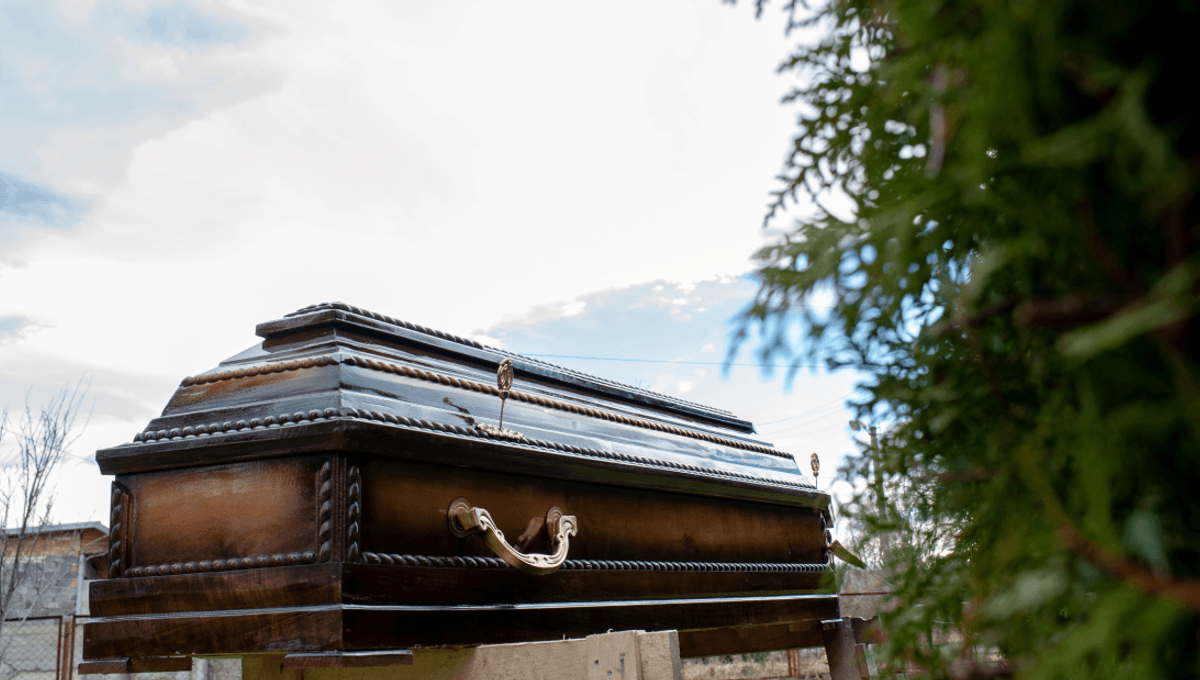
Human burial has been practiced for millennia as a way of dealing with our dead, but it’s not a perfect solution. America is estimated to contain around 404,685 hectares (1 million acres) of land currently dedicated to human burial, and the production of caskets sees around 1.6 million hectares (4 million acres) of forest lost each year. So, what if we just did away with all the accessories? Why is it necessary to bury the dead in coffins rather than just in the ground?
Carrying the dead
Death comes knocking when it pleases and that means we need a way of getting corpses to their burial site that’s both convenient and dignified. Body bags are used by the emergency services, but when the family’s gathered around to say goodbye to Uncle Ted, it figures they’d prefer to see him go in something more sophisticated than a super-sized holdall.
Coffins’ handles, solid shape, and concealment of the corpse means we can carry dead bodies safely and efficiently, sparing mourners the smell of death (which, by the way, elicits an interesting human response). Sometimes, the right coffin can even save lives.
Corpses spread diseases
When we die, our bodies become a hive of activity as bacteria that were once kept in check by our immune system thrive, and they’re not the only things that can live on after we’ve kicked the bucket. There are many diseases that can be passed on by corpses, including tuberculosis, cholera, and hemorrhagic diseases, according to the World Health Organization, and the risk is higher for people routinely handling the dead.
For corpses that are considered especially high risk, the coffin can be sealed to further reduce the risk of contagion. Lead-lined coffins have been a tradition among royalty ever since William The Conqueror burst out of his sarcophagus in an explosion of bowels, and they’re still a legal requirement for any coffins interred above ground in the UK.
Slowing decomposition
If you die out in the wild, you will still be far from alone as your body breaks down thanks to the decomposition ecosystem. Death lures in a rich diversity of organisms, from microbes to blowflies, and even scavengers that can scatter our remains far and wide.
The decomposition ecosystem is a remarkably sophisticated cascade of trophic interactions that means we’re not left with a whole load of dead bodies out in the wild, but it can have its downsides. Were bodies buried in a cemetery without a coffin and just a small bit of earth on top, chances are they wouldn’t stay underground for long.
Flies can dig for corpses 2 meters (6.6 feet) deep and enter coffins to lay eggs, so you can imagine the fun they’d have with a whole field of freshly planted human remains. Foxes, coyotes, opossums, badgers, raccoons, vultures, and crows are among the best-known taphonomic agents, but so too are domestic dogs, which could make fetch get awkward real fast when Fido comes running back with a femur.
Keeping unwanted visitors out
Funerary practices are steeped in culture and the burial sites of ancient humans have provided fascinating insights into what they held dear in life, often because they were sent to the grave with their most precious belongings. The smell of death may lure in blowflies, but it’s the promise of treasure that gave rise to tomb raiders and grave robbers.
Coffins are just one barrier to keep grave robbers at bay, but when there was a spike in body snatching for scientific research, things got more creative. Judge Thomas N Howell advertised a revision of an explosive invention called the coffin torpedo that came complete with a catchy slogan:
Sleep well sweet angel, let no fears of ghouls disturb thy rest, for above thy shrouded form lies a torpedo, ready to make mincemeat of anyone who attempts to convey you to the pickling vat.
Bad news for the grave robbers, then, but they had a backup plan when it came to evading vengeful spirits.
What if I don’t want to be buried?
If coffins, caskets, and decaying underground don’t sound like your thing, then boy are you lucky to be perishing in the 21st century. Today, there are all kinds of alternatives to human burial, including cremation, aquamation, and even becoming compost.
Good luck grave robbing my mulch heap, I say.
Source Link: Why Do We Bury People In Coffins And Not Just In The Ground?